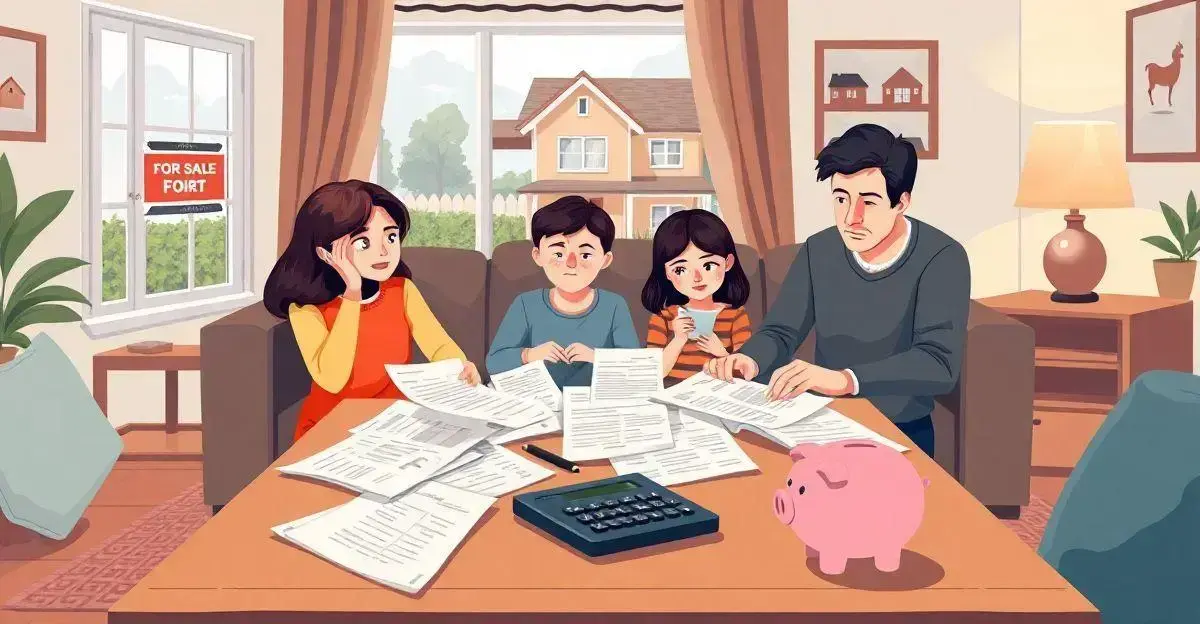Can credit card debt take your house? Many homeowners worry about this situation without knowing the facts.
The reality is that while credit card debt itself does not automatically lead to losing your home, there are circumstances where it can become a serious risk.
Understanding the backbone of credit card debt and its potential implications on your property is crucial.
Understanding credit card debt
Understanding credit card debt is essential for managing your finances effectively. This debt occurs when you borrow money through a credit card and fail to repay it in full by the due date. It can lead to high-interest rates, late fees, and a growing balance that becomes difficult to manage.
But can credit card debt take your house? While credit card companies don’t have direct claims to your property, failing to pay your debt can lead to legal actions, which might result in wage garnishments or other financial consequences that indirectly impact your ability to maintain your home.
One important factor to consider is interest rates. Credit cards often have high-interest rates, making it challenging to pay off the debt quickly. If you only make the minimum payments, a significant portion goes toward interest rather than the principal balance.
Another crucial aspect is credit utilization, which refers to the ratio of your credit card balances to your credit limits. High utilization can negatively affect your credit score, making it harder to obtain loans in the future.
To combat credit card debt, it’s vital to create a budget that includes all your expenses and income. This approach allows you to identify areas where you can cut back and allocate more funds toward paying off your debt. Additionally, consider seeking help from financial advisors or credit counseling services, which can provide valuable insights into managing and reducing your debt efficiently.
How debt can affect your home

How Debt Can Affect Your Home is a critical topic for many homeowners. When you have credit card debt, the risk to your home can increase if you fall behind on payments. Although credit card companies cannot directly take your house, they can take legal action that may ultimately lead to foreclosure.
The first way that debt can impact home ownership is through garnishments. If a creditor wins a lawsuit against you, they might be able to garnish your wages or place a lien on your property. This legal claim could affect your ability to sell or refinance your home later.
Another significant concern is credit scoring. High levels of debt can negatively affect your credit score, making it harder to obtain loans needed for home repairs or other essential expenses. A poor credit score might force you to pay higher interest rates.
Moreover, if you are unable to manage your debts, it could lead to significant stress, affecting your ability to keep up with your mortgage payments. Managing your finances wisely and seeking the right guidance is essential in avoiding these risks.
Legal implications of debt
The legal implications of debt can significantly impact your financial situation and homeownership status. When you accumulate debt, particularly credit card debt, several potential legal ramifications arise. One pressing concern is whether credit card debt can take your house.
If you fail to pay your debts, creditors may take legal action against you, potentially resulting in judgment liens on your property. If a creditor obtains a judgment, they gain a legal right to your property through a certificate of judgment. This can hinder your ability to sell or refinance your home and may even lead to a forced sale if the debt remains unpaid.
Additionally, being in debt can result in bankruptcy filings. While bankruptcy may offer relief, it also has long-term consequences for your credit and your ability to secure loans in the future. Different types of bankruptcy, such as Chapter 7 or Chapter 13, come with distinct requirements and effects on your assets.
Furthermore, debt collection agencies may become involved, pursuing you for unpaid debts. If their efforts are unsuccessful, they might seek court orders to garnish your wages or levy your bank accounts. Understanding the potential legal consequences of your debt is essential for protecting your assets.
Preventing home loss due to debt

Preventing Home Loss Due to Debt is essential for homeowners to understand. Keeping your home safe from financial distress requires proactive measures. Start by creating a realistic budget that tracks all income and expenses to identify where you can save. This will help you allocate funds toward debt payments and your mortgage.
Another vital strategy is communication with creditors. If you are facing financial difficulties, reach out to your creditors to discuss your situation. They may offer payment plans or deferments to help you manage your debt.
Additionally, consider debt management programs that can assist in consolidating and reducing your debt payments. These programs can be excellent for reorganizing your finances and prioritizing your mortgage payments.
Finally, it’s essential to maintain an emergency fund. Saving for unexpected expenses can prevent you from falling behind on payments in the event of job loss or medical emergencies. By taking these steps, you can help protect your home from the effects of debt.
Working with creditors
Working with creditors is an essential step in managing your debt and preventing financial issues. If you find yourself struggling with credit card debt, being proactive is crucial, especially if you’re worried about whether credit card debt can take your house.
Start by gathering all your financial information, including balances, interest rates, and monthly payments. This will provide a clear picture of your situation.
Next, reach out to your creditors. Open communication can often lead to solutions. Many creditors are willing to work with you, especially if they see you are making an effort to pay off your debt. They may offer lower interest rates or extended payment periods, which can help ease your financial burden.
Consider proposing a payment plan that fits your budget. When you approach creditors with a reasonable offer, they may be more inclined to accept. Additionally, keep detailed notes of all conversations for your records, as this can help prevent misunderstandings.
If you feel overwhelmed, seeking help from a credit counseling service may be beneficial. These professionals can negotiate with creditors on your behalf and provide guidance on managing your finances. Remember, being honest and consistent in your communications can lead to positive outcomes.
Seeking financial advice

Seeking financial advice is a smart move when dealing with debt, especially if you’re concerned about whether credit card debt can take your house. While credit card companies can’t directly take your home, unpaid debts can lead to lawsuits and potential liens on your property, indirectly affecting your financial stability.
If credit card payments pile up, professional help can be beneficial. First, find a certified financial advisor who specializes in debt management or Investment Banking. They can assess your financial situation and help create a tailored strategy for managing and reducing your debt.
In addition, attending financial workshops can open your eyes to budgeting and debt reduction techniques. Many local community centers or online platforms offer free resources that equip you with essential skills. These workshops often provide real-life examples, making it easier to grasp challenging concepts.
FAQ – Frequently Asked Questions about Credit Card Debt
Can credit card debt really take my house?
Credit card debt itself cannot take your house, but if you fall behind on payments, creditors may take legal action that can lead to foreclosure.
What should I do if I’m unable to make my credit card payments?
You should communicate with your creditors as soon as possible to discuss potential payment plans or hardship options.
How can I prevent losing my home due to debt?
Creating a budget, maintaining open communication with creditors, and seeking financial advice can help you prevent home loss.
What are the first steps I should take to manage my credit card debt?
Review your financial situation, create a payment plan, and reach out to financial advisors for personalized assistance.
Is it beneficial to work with a credit counselor?
Yes, credit counselors can provide guidance and help negotiate with creditors, making it easier to manage your debt.
How can I improve my credit score while dealing with debt?
Make timely payments, reduce overall debt balances, and check your credit report for errors to improve your credit score.